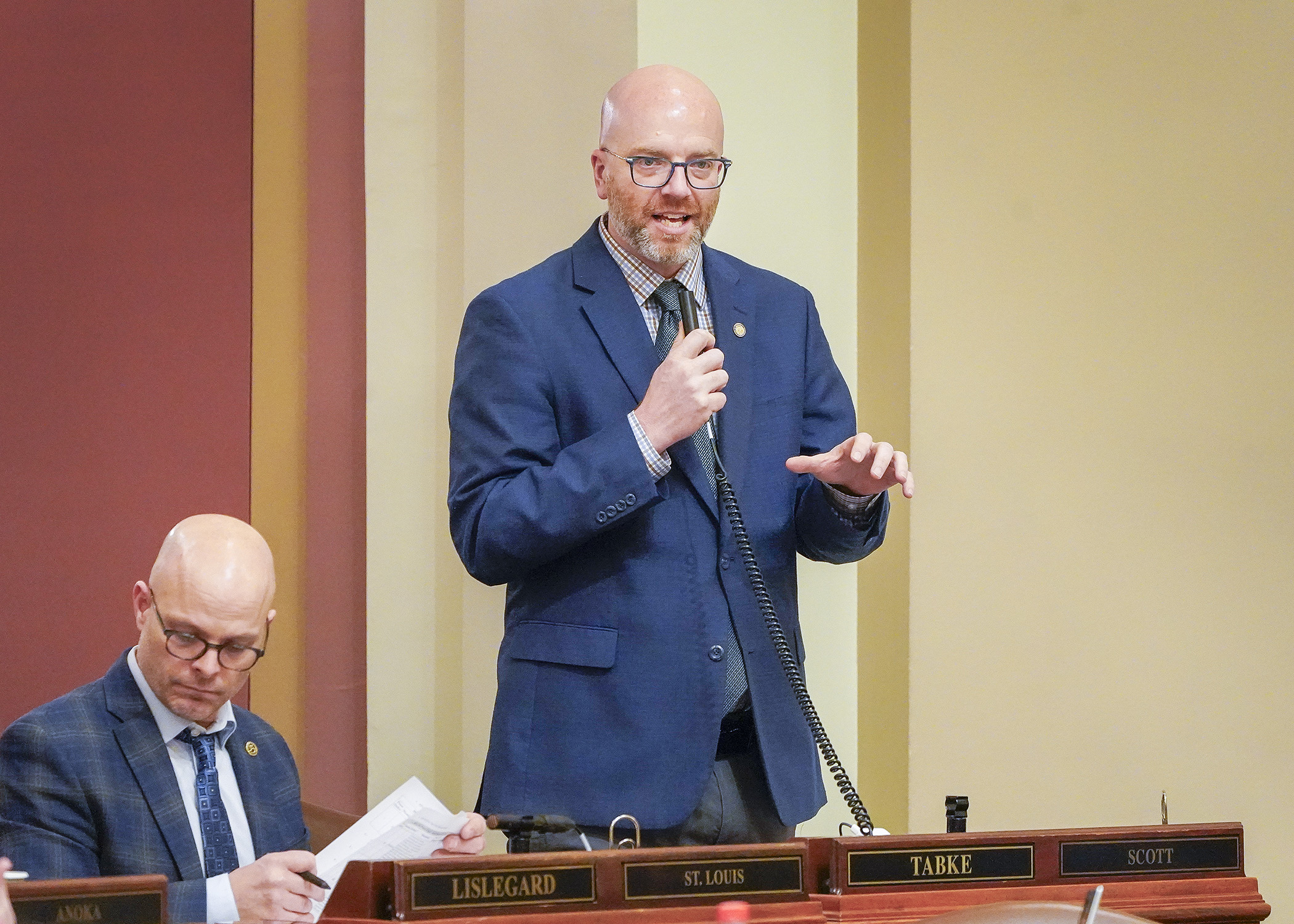House greenlights transportation policy bill

— UPDATED at 9:06 p.m.
House members who voted in favor of a bill that allows registration of flying cars can make a strong case the transportation policy bill is looking toward the future. Those who voted “no” however, would argue the bill falls short by not making up for past mistakes.
The House passed its transportation policy bill, HF3436, as amended, 97-34 Thursday.
Provisions would update state law regarding acceptable proof of identity, state trooper contracts, disaster aid for road repair, teleconferenced driver’s education classes, and yes, flying cars.
Everyone did a lot of work to bring a lot of different ideas forward, said Rep. Brad Tabke (DFL-Shakopee), who sponsors the bill. Besides making many technical corrections, the bill aims to improve safety and efficiency on roads and rails.
Republican opponents, though, argued that the Legislature should reconsider past decisions such as spending on passenger rail and fees for retail delivery.
[MORE: Bills included in the transportation policy bill]
It would spell out best practices for safely transporting children. Children younger than age 2 would have to be in a rear-facing car seat; kids between the ages 2 and 4 would need to be in a car seat; and those ages 4 to 9 would have to be in a booster seat. Children 13 and younger would have to ride in the back seat when one is available.
It would also require a Minnesota State Fair transportation plan to reduce traffic, congestion and parking around the fairgrounds and expand bike storage and rideshare opportunities. Rep. Pat Garofolo (R-Farmington) has an amendment ready to be offered that would require the plan address the possibility of there being no rideshare companies operating in the Twin Cities.
Other provisions in the bill would:
- update speed studies;
- cut the time required in a crash prevention course for drivers 55 and older from eight hours to four hours;
- clarify that people should call 911 in the event of a train crash resulting in a potential hazardous material spill, and not have to reach a town’s fire chief directly;
- remove a prohibition on spending trunk highway funds on electric car infrastructure, potentially accessing federal dollars;
- let the Department of Transportation promote interstate train travel;
- define roadable aircraft (flying cars), clarify they are different from motorcycles, allow them to be registered and make it a misdemeanor to take off or land except at airports;
- allow limited license agents to become full-service providers;
- prohibit towing solely for unpaid parking tickets as is currently allowed for five tickets, while still allowing towing of abandoned vehicles; and
- allow people to list more than three people they take care of who would need to be checked in an emergency.
Amendments
One of the biggest issues Rep. Harry Niska (R-Ramsey) hears about is scheduling driving tests. He offered two amendments aiming to make it easier. “I understand there have been efforts on this, but it is far from fixed,” he said.
An amendment to get a handle on the problem with a report was added. One that would ensure people could browse for appointment times without having to set up an account was unsuccessful. Tabke said it could allow people to register for multiple appointments causing further backlog and would likely need a fiscal note to account for programming.
The House also adopted an amendment which would modify notice of underground excavation under Gopher State One Call. The provision followed months of conversations and represents consensus among stakeholders, such as those in cable and construction industries, said Rep. Larry Kraft (DFL-St. Louis Park), who sponsors the underlying bill HF2717.
Rep. John Petersburg (R-Waseca) unsuccessfully offered an amendment to have funds from “blackout” license plates go to roads via the highway user tax distribution fund rather than license and registration services. Tabke said the idea has merit but feels it needs more discussion in committee.
Related Articles
Search Session Daily
Advanced Search OptionsPriority Dailies
Speaker Emerita Melissa Hortman, husband killed in attack
By HPIS Staff House Speaker Emerita Melissa Hortman (DFL-Brooklyn Park) and her husband, Mark, were fatally shot in their home early Saturday morning.
Gov. Tim Walz announced the news dur...
House Speaker Emerita Melissa Hortman (DFL-Brooklyn Park) and her husband, Mark, were fatally shot in their home early Saturday morning.
Gov. Tim Walz announced the news dur...
Lawmakers deliver budget bills to governor's desk in one-day special session
By Mike Cook About that talk of needing all 21 hours left in a legislative day to complete a special session?
House members were more than up to the challenge Monday. Beginning at 10 a.m...
About that talk of needing all 21 hours left in a legislative day to complete a special session?
House members were more than up to the challenge Monday. Beginning at 10 a.m...